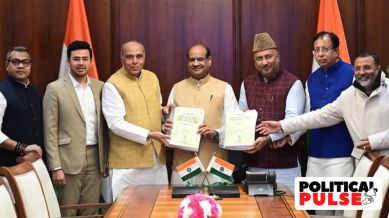Waqf Bill today, a look at how it emerged as NDA-INDIA flashpoint
The NDA should have no difficulty getting the contentious Bill through Parliament as it has the requisite numbers in both Houses.

The Centre is set to introduce the Waqf (Amendment) Bill, 2024, in Parliament on Wednesday.
According to the government, the Bill seeks to improve the administration and management of Waqf properties in India. “It aims to overcome the shortcomings of the previous Act and enhance the efficiency of Waqf boards by introducing changes such as… updating the definition of Waqf, improving the registration process, and increasing the role of technology in managing Waqf records,” a statement issued by it in September last year said.
monthly limit of free stories.
with an Express account.
Since the time it was introduced though, the Bill has elicited criticism across the country, with Muslim organisations including the All India Muslim Personal Law Board (AIMPLB) holding protests.
Some of the most contentious provisions in the Bill include allowing a non-Muslim to become the Chief Executive Officer of the Waqf board, making a provision for at least two non-Muslim members to be appointed by state governments to their state’s Waqf board, giving the District Collector the power to determine if a disputed property is Waqf or belongs to the government, doing away with the concept of “Waqf by user”, mandating that every Waqf property be registered on a central database within six months of the law’s commencement, and removal of the provision that made the tribunal’s decision final.
The Bill was introduced in Parliament last year amid uproar by the Opposition and was subsequently sent to a Joint Committee of Parliament headed by BJP MP Jagadambika Pal for scrutiny. On February 13, the House panel submitted its report, which was approved by the Union Cabinet on February 19. However, Opposition MPs in the panel raised concerns over their proposed amendments being rejected and claimed their dissent notes had been redacted from the report without their knowledge. The panel accepted 14 changes suggested by NDA MPs and is learnt to have rejected all 44 changes proposed by the Opposition members.
The panel’s proceedings leading up to the report too were stormy. TMC MP Kalyan Banerjee was suspended for a day for disrupting the proceedings of the panel and smashing a bottle on the table during one of its meetings. Six Opposition MPs – Banerjee, Asaduddin Owaisi (AIMIM), Mohammad Jawed (Congress), Sanjay Singh (AAP), Mohammed Nadimul Haque (TMC) and M M Abdulla (DMK) – even wrote to Lok Sabha Speaker Om Birla accusing Pal of “bulldozing the proceedings” of the panel.
“We, the members from the Opposition feel that the constitution of the panel, i.e. a mini Parliament, should not be treated as a mere ventilating chamber to get the Bill passed as desired by the government, ignoring the parliamentary process by using the so-called ‘majority’ undemocratically. Hence, it is our duty to bring to your notice with pain that bulldozing the proceedings of the parliamentary committee without assigning reasonable and plausible time pause as against the will of the members is nothing but an act of atrocious onslaught on the Constitutional religion and Parliament,” the letter stated.
Ahead of the panel’s final meeting on January 30, BJP MP Nishikant Dubey in an interview with The Indian Express dismissed the concerns and said the panel ensured that the Bill, which aimed to “bring Muslims into the mainstream”, addressed all issues.
How the numbers stack up?
In the Lok Sabha, with allies TDP and JD(U), the NDA seems to have the numbers to ensure that the Bill sails through.
In the Rajya Sabha, which has a strength of 245, the NDA has 125 MPs. With nine berths vacant, the NDA needs the support of 118 MPs — which it has — to ensure that the Bill passes.
While the BJP has issued a whip to all its Lok Sabha MPs directing them to be present in the House on Wednesday, the Opposition INDIA bloc was holding a meeting on Tuesday evening to discuss their floor strategy for when the Bill is introduced in Parliament.
Among the non-aligned parties, the Y S Jagan Mohan Reddy-led YSR Congress Party (YSRCP) has said it will oppose the Bill in both Houses. So will Owaisi and Chandrashekhar Azad of the Aazad Samaj Party (Kanshi Ram).